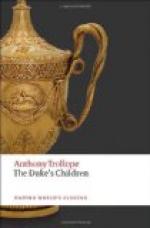He and Gerald reached Crummie-Toddie late on the evening of August the eleventh, and found Reginald Dobbes alone. That was on Wednesday. Popplecourt and Niddledale ought to have made their appearance on that morning, but had telegraphed to say that they would be detained two days on their route. Tregear, whom hitherto Dobbes had never seen, had left his arrival uncertain. This carelessness on such matters was very offensive to Mr Dobbes, who loved discipline and exactitude. He ought to have received the two young men with open arms because they were punctual; but he had been somewhat angered by what he considered the extreme youth of Lord Gerald. Boys who could not shoot were, he thought, putting themselves forward before their time. And Silverbridge himself was by no means a first-rate shot. Such a one as Silverbridge had to be endured because from his position and wealth he could facilitate such arrangements as these. It was much to have to do with a man who could not complain if an extra fifty pounds were wanted. But he ought to have understood that he was bound in honour to bring down competent friends. Of Tregear’s shooting Dobbes had been able to learn nothing. Lord Gerald was a lad from the Universities; and Dobbes hated University lads. Popplecourt and Niddledale were known to be efficient. They were men who could work hard and do their part of the required slaughter. Dobbes proudly knew that he could make up for some deficiency by his own prowess; but he could not struggle against three bad guns. What was the use of so perfecting Crummie-Toddie as to make it the best bit of ground for grouse and deer in Scotland, if the men who came there failed by their own incapacity to bring up the grand total of killed to a figure which would render Dobbes and Crummie-Toddie famous throughout the whole shooting world? He had been hard at work on other matters. Dogs had gone amiss;—or guns, and he had been made angry by the champagne which Popplecourt had caused to be sent down. He knew what champagne meant. Whisky-and-water, and not much of it, was the liquor which Reginald Dobbes loved in the mountains.




